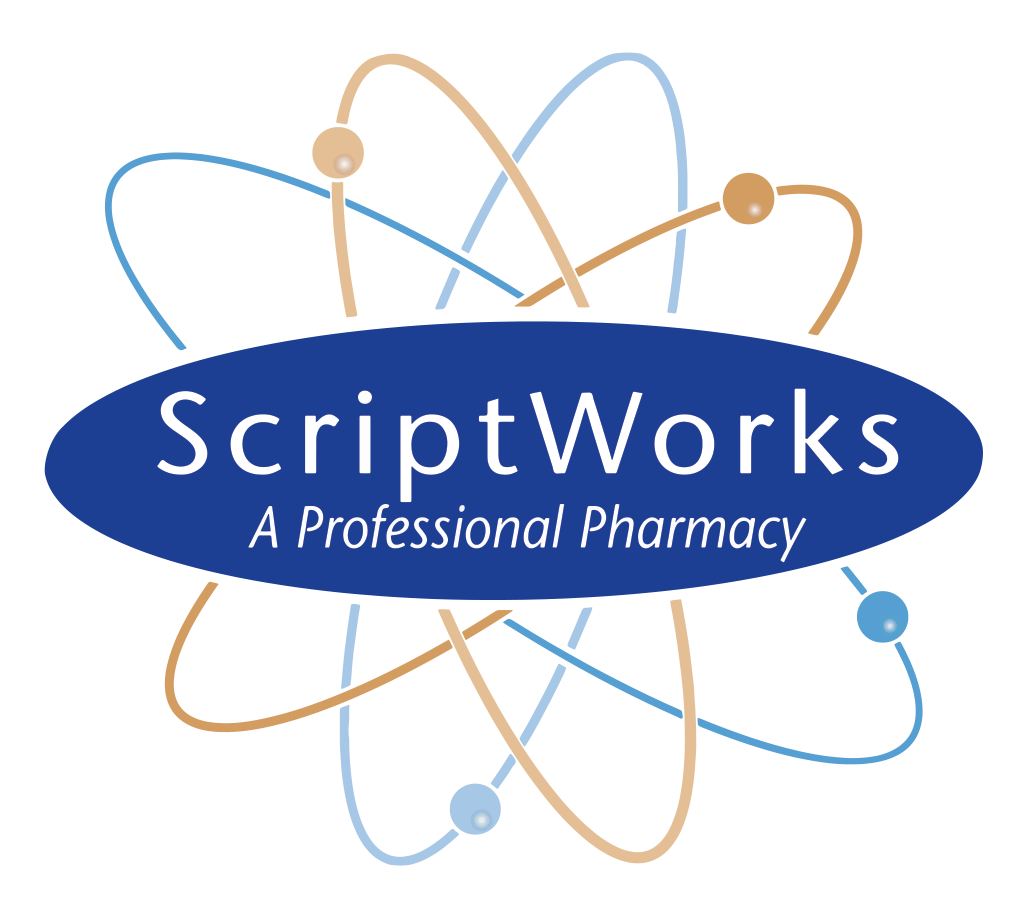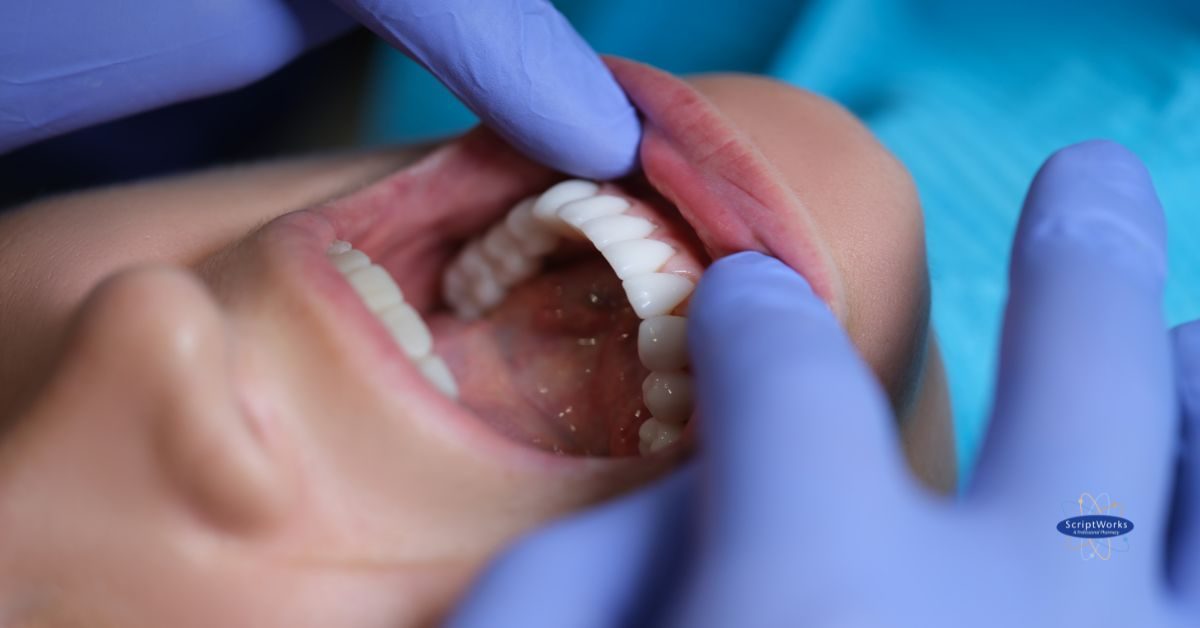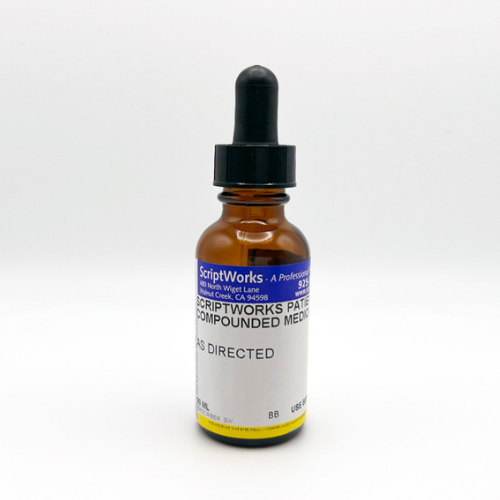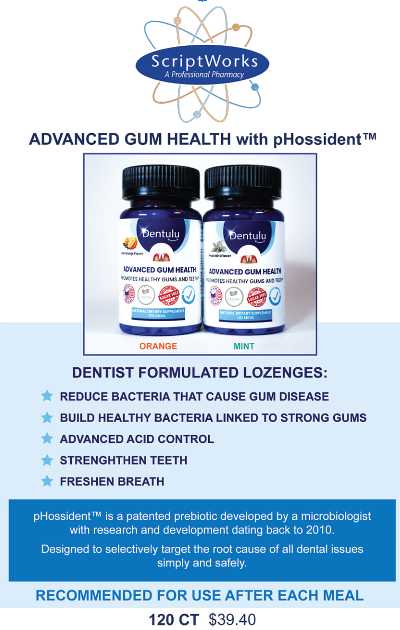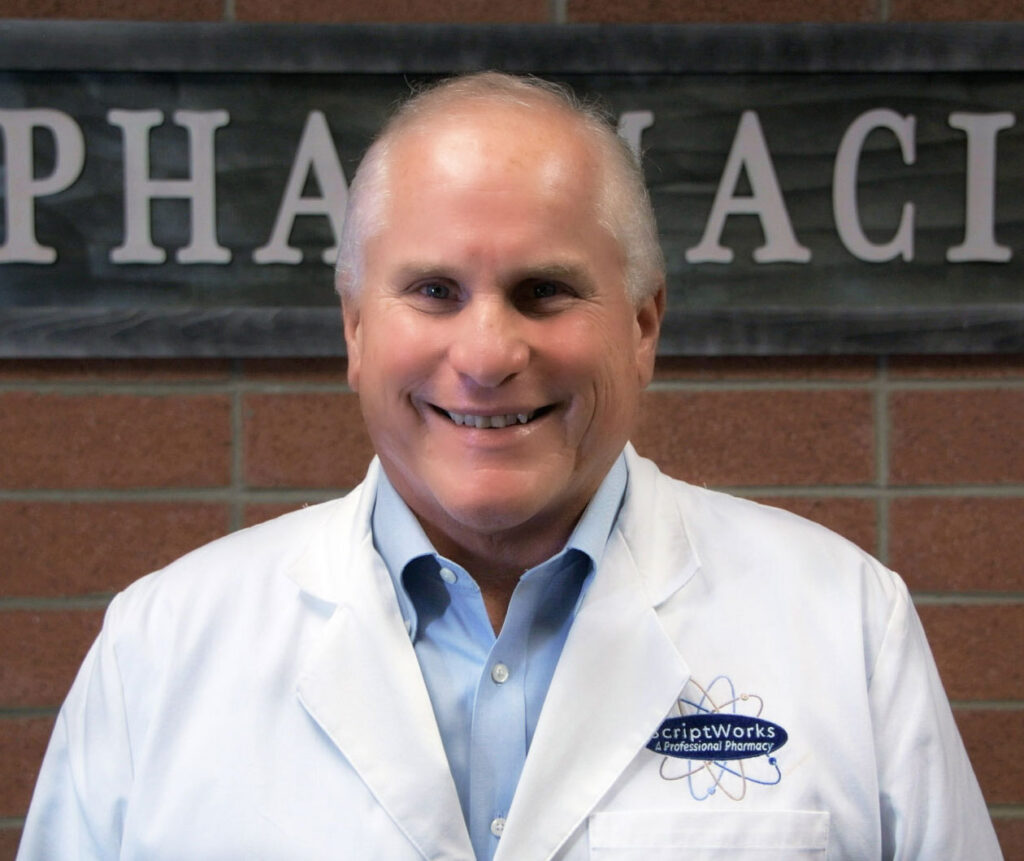
Author: Bob Brensel | President, Pharmacist | ScriptWorks
Bob Brensel, RPh, earned his Pharmacy Degree at University of the Pacific in Stockton, California in 1980. Former California Pharmacists Association’s Award Winner for Recognition of Outstanding Achievement in Compounding Pharmacy. Read More →
Treating Periodontal Disease
Compounded Medication with Perio Gel + Doxycycline for Gum Disease
Perio Gel’s primary active ingredient is Hydrogen Peroxide which serves two roles. First and foremost, it kills bacteria. In addition, the bubbles from the hydrogen peroxide are releasing oxygen deep into the gum pockets. This creates a healthier environment for bacterial growth, so healthy bacteria can repopulate and exclude bad, pathogenic bacteria. Read More
Sub-antimicrobial-dose doxycycline (SDD) is widely used as an adjunctive therapy for scaling and root planning.
For patients dealing with periodontal disease, Perio Gel + Doxycycline may be an essential prescription medication. Used with the Perio Protect Method, doxycycline, a tetracycline antibiotic, is delivered directly to gum pockets along with hydrogen peroxide via custom dental trays.
This targeted approach may result in reduced inflammation and bone loss and increase in bone growth as well as increased oxygenation of the gum area.
Doxycycline is a broad-spectrum antibiotic that belongs to the tetracycline class of antibiotics. It is commonly used to address a wide variety of bacterial infections and works by inhibiting the growth and reproduction of bacteria.
How Doxycycline Calcium Works
In controlled clinical trials, Doxycycline Calcium Dye Free Dental Suspension, when given as a sub-clinical dose with 1.7% hydrogen peroxide (Perio Gel), helped reduce inflammation. It was shown to potentially decrease oxidative stress during the initial phase of addressing acute and chronically inflamed tissues. It caused a decreased matrix metalloproteinases to reduce connective tissue breakdown. It can also potentially manage long-term osteogenic activity by decreasing osteoclastic activity and enabling osteoblasts to continue to function. Clinically, this usage has resulted in decreased bone loss and increased bone healing/repair.
Instructional Video
Bob Brensel, RPh demonstrates the step-by-step process of using Perio Protect system.
If you have more questions about this product and its usage, feel free to ask our pharmacists.
Why CA Dentists Prescribe Doxycycline + Perio Gel
Many California Dentists are familiar with the potential benefits of Tetracyclines and Hydrogen Peroxide.
CA Practitioners
Are you ready to prescribe Doxycycline?
Our Rx Order Forms can be accessed by verified Providers.
Related Article
Sachdevaa, S., Mania, A., & Salujab, H. (2021). Bullet for periodontal disease in future: Chemically modified tetracyclines. Journal of Cellular Biotechnology, 7, 111-117. Link
“The revolutionary idea of attacking the host response aspect of periodontitis with sub-antibacterial dose doxycycline is both highly effective and very safe.”
Source: Journal of Cellular Biotechnology
Backed by research, the Perio Protect Method utilizing doxycycline is promising in managing gum disease, offering a non-invasive option.
Combining Innovation and Expertise
At ScriptWorks, we’re committed to advancing oral health through innovative products and personalized care. Combining cutting-edge therapies such as Doxycycline + Perio Gel, along with supplement recommendations such as Dentulu pHossident™ Gum Health Lozenges, we’re here to offer comprehensive solutions for a wide range of dental needs.
Whether you’re addressing gum disease, maintaining daily oral hygiene, or exploring preventive care options, our team of experts works closely with California healthcare providers and patients to develop an optimal plan to best address patient conditions.
Dentulu pHossident™ lozenges are designed to protect and strengthen your teeth from the inside out. These mints help fortify enamel, support gum health, and promote a balanced oral microbiome. The added potential benefits of prebiotics and pHossident™ work to keep your mouth healthy while refreshing your breath.
Dentulu Advanced Gum Health with pHossident™
Dentulu Advanced Gum Health Mints are designed to:
Strengthen tooth enamel
Block bacterial acid production
Improve Oral Microbiome
Increase the Oral pH
Reduce bacteria associated with cavities
These statements have not been evaluated by the Food and Drug Administration. This product is not intended to diagnose, treat, cure or prevent any disease.
Patented formula intended to supplement daily dental care & hygiene. Contains no animal products, nuts, wheat, gluten, soy, egg, fish, shellfish, milk, dyes and preservatives.
SAFE TO SWALLOW. CONTAINS XYLITOL, DO NOT GIVE TO DOGS
Why Choose ScriptWorks for Dental Compounding?
Clinical Expertise: Our pharmacists are knowledgeable in the latest dental therapies and compounding techniques with over 20 years of experience serving California statewide. Practitioners and patients come to us with their questions or difficult cases, where we can lay out a plan for the most targeted approach.
For more information about Dentulu pHossident™ Gum Health Lozenges or Doxycycline + Perio Gel, contact ScriptWorks today and discover how our dental compounding can elevate your oral health care!
References
Cochrane, B. (2013). “In a generation, trays are going to change the face of dentistry”: one clinician’s view on the Perio Protect Method and Perio Trays. DPR. Link
Dunlap T. (2016). Prescribing hydrogen peroxide in the treatment of periodontal disease. Oral Health, 64-68. Link
Dunlap, T., Keller, D., Marshall, M., Costerton, J., Schaudinn, C., Sindelar, B., & Cotton, J. (2011). Subgingival delivery of oral debriding agents: a proof of concept. The Journal of Clinical Dentistry, 22(5), 149-158. Link
Fraser, G. (2018). Treating periodontal disease with perio protect: Catapult Education members evaluate this gum disease treatment device. DPR, 90-91. Link
Keller, D., Buechel, M., Goldstein, J., Sawyer, G., & Dunlap T. (2017). Managing peri-implantitis and peri-mucositis with direct medication delivery. Int J Dent & Oral Heal, 103-116. Link
Keller D. (2014). Systemic Lp-PLA-2 cardiovascular marker response to direct medication delivery periodontal treatment. Cardiovascular System, 2(8). Link
Keller, D. (2010). Managing periodontal disease in a patient suffering from renal failure. DPR, 44(7), 54-55. Link
Keller, D.C. (2006). Management of periodontitis for HIV-AIDS patients: case study. Dentistry Today, 25(6), 110-3. Link
Keller, D.C. & Buechel, M. (2017). Direct medication delivery modifies the periodontal biofilm. Oral Biol Dent, 1. Link
Lin, J., Zhou, D., Steitz, T. A., Polikanov, Y. S., & Gagnon, M. G. (2018). Ribosome-targeting antibiotics: modes of action, mechanisms of resistance, and implications for drug design. Annual review of biochemistry, 87(1), 451-478.
Marshall, M., Cancro, L., & Fischman, L. (1995). Hydrogen peroxide: a review of its use in Dentistry. J Periodontol, 66(9), 786-96. Link
Putt, M., Mallatt, M., Messmann, L., & Proskin, H. (2014). A 6-month clinical investigation of custom tray application of peroxide gel with or without doxycycline as adjuncts to scaling and root planning for treatment of periodontitis. American Journal of Dentistry, 27, 273-284. Link
Putt, M. & Proskin, H. (2013). Custom tray application of peroxide gel as an adjunct to scaling and root planing in the treatment of periodontitis: a randomized, controlled three-month clinical trial. The Journal of Clinical Dentistry, 24,100-107. Link
Sachdevaa, S., Mania, A., & Salujab, H. (2021). Bullet for periodontal disease in future: Chemically modified tetracyclines. Journal of Cellular Biotechnology, 7, 111-117. Link
Seymour, R. A., & Heasman, P. A. (1995). Tetracyclines in the management of periodontal diseases: A review. Journal of clinical periodontology, 22(1), 22-35. Link
Singh, S., Khanna, D., & Kalra, S. (2021). Minocycline and doxycycline: more than antibiotics. Current Molecular Pharmacology, 14(6), 1046-1065. Link
Explore Related Studies
Explore More Related Articles
Putt M, Mallatt M, Messmann L, and Proskin H. American Journal of Dentistry. 2014;27:273-284.
This study evaluates the 6-month clinical effects of one scaling and root planing (SRP) procedure alone or combined with local administration of hydrogen peroxide gel (with or without inclusion of doxycycline for 2 weeks) via Perio Trays® for treatment of subjects with chronic periodontitis. In the test groups, Perio Tray delivery started at baseline, SRP followed three weeks later, and daily Perio Tray usage continued throughout the trial. The control group received SRP at the same time as the test groups. BI and PPD data were collected one week before SRP, two weeks after SRP, and at 3 and 6 months. Results indicate that mean BI dropped significantly only for test groups before SRP. Two weeks post-SRP, BI reductions for test groups were significantly greater than the control, and remained so for most comparisons. Analysis of pockets >5mm at baseline showed that mean PPD for both test groups significantly decreased from baseline before SRP. By 26 weeks, mean PPD decreased > 1.10 mm for both test groups compared to 0.38 mm for the SRP-only control (P< 0.001 for test versus control at all post-SRP comparisons). Analysis of pockets ≤ 5 mm at baseline showed the same relationship between groups (P< 0.001 for test versus control).
____
Putt M and Proskin H. The Journal of Clinical Dentistry. 2013;24:100-107.
When compared with SRP alone, clinical improvements in PPD (e.g. ~1.0 mm for pockets >5 mm at baseline) were maintained for up to 6 months after SRP with adjunctive use of 1.7% hydrogen peroxide gel, locally administered using prescription, customized trays in the treatment of subjects with moderate to advanced periodontitis.
____
Case series data were analyzed from 66 failing periodontal maintenance patients who had exhausted treatment options before using prescription trays with a 1.7% hydrogen peroxide gel once or twice daily for two-and-a-half to five years. Data included pocket probing depths (PPD), bleeding on probing (BOP), smoking status, and compliance with tray usage. Data were collected prior to tray usage and after tray delivery at six months, one year, and annual intervals. A clinical and statistical reduction in BOP was maintained over the length of the study (p ≤ 0.01). No differences were seen in patients who used trays two times or one time a day or in patients who smoked or did not smoke.
Independent Reviews
Perio Protect-A Conservative Periodontal Therapy Adjunct.
Clinicians Report. March 2009:2(3)1,3-4.
Independent evaluation of the Perio Protect Method® documents 98% of doctors surveyed reported reduced bleeding for patients following the Perio Protect Method®. 95% also reported reduced inflammation, and 90% reported decreased pocket depths. In the majority of cases, these results were apparent in 2 weeks time.
____
Fraser G. DPR. (2018)May:90-91.
Independent evaluation of the Perio Protect Method® documents 98% of doctors surveyed reported reduced bleeding for patients following the Perio Protect Method®. 95% also reported reduced inflammation, and 90% reported decreased pocket depths. In the majority of cases, these results were apparent in 2 weeks time.
____
Cochrane B. DPR. (2013)July.
One periodontist’s view on how Perio the Perio Protect Method is customizable to fit the needs of individual patients who are working to battle biofilm.
____
Minimally Invasive, State of the Art Treatment Patients Love.
Wood C. Dentistry Today
An interview with Charissa Wood, RDH who practices at Atlanta Dental Spa with Dr. Peter Boulden, a Perio Protect Provider. Charissa gives her insights on the secrets of her office’s success.
____
Clinical Practice
Managing Peri-Implantitis and Peri-Mucositis with Direct Medication Delivery.
Keller D, Buechel M, Sawyer G, Goldstein J. Int J Dent & Oral Heal. (2017) 3:10,103-116.
Direct medication delivery of hydrogen peroxide gel and doxycycline using custom formed medical devices are effective in treating periodontal disease, peri-implantitis and perimucositis. Direct medication delivery demonstrates a significant modification in the biofilm by decreasing the number and virulence of bacteria, improving tissue responses and decreasing pocket probing depth and bleeding upon probing.
____
Keller D. Cardiovascular System 2014;2(8):15 November 2014
Inflammatory markers such as lipoprotein-associated phospholipase A2 (Lp-PLA-2) demonstrate an increased risk of heart attack and ischemic stroke. This case report discussed treating patients’ periodontal conditions with the Perio Protect Method (PPM) and evaluating systemic Lp-PLA-2 levels, before, during and after periodontal treatment. Treating the patient’s periodontal conditions results in decreasing the periodontal markers and lowering the Lp-PLA-2 levels and these findings may be important as an adjunct of cardiovascular treatment.
____
Keller, D. DPR 2010 July;44(7):54-55.
This case study follows one patient with advanced periodontal disease for four years. Photos, radiographs, and charting indicate significantly improved heath with significant bone gains and pocket depth reductions.
____
Managing Periodontal Disease In A Patient Suffering From Renal Failure.
Keller, D.C. Dentistry Today. July 2008:27(7)144-47.
This case study report examines the results of the Perio Protect Method® to help successfully manage the periodontal conditions of a patient during renal failure, when systemic calcium levels are often related to an increased incidence of periodontal disease.
____
Management of Periodontitis for HIV-AIDS Patients.
Keller, D.C. Dentistry Today. June 2006;25(6):110-3.
Patients with HIV-AIDS are reported to have higher incidences and severity of periodontal disease. This case study report demonstrates that a patient with HIV-AIDS and severe periodontal problem successfully managed the disease for more than 4 years with Rx Perio Trays®.
____
Biofilm, Hydrogen Peroxide & Proof of Concept
Direct medication delivery modifies the periodontal biofilm.
Keller DC and Buechel M., Oral Biol Dent. 2017; 5:1.
This study indicates that direct medication delivery of medicaments with a custom formed tray modifies the biofilm from a more virulent anaerobic to a less virulent aerobic composition and reduces the number of pathogens. Fewer bacteria that are less virulent should provide better treatment results.
____
Prescribing Hydrogen Peroxide in the Treatment of Periodontal Disease.
Dunlap T. Oral Health 2016;Dec:64-68.
Hydrogen peroxide has a long and safe track record in dentistry and has been used in tray delivery for more than 10 years to treat periodontal disease. Classified as an oral debriding agent and an oral wound cleanser, peroxide is an effective antimicrobial for chronic oral wounds inducing periodontal disease.
____
Subgingival Delivery of Oral Debriding Agents: A Proof of Concept.
Dunlap T, Keller D, Marshall M, Costerton J, Schaudinn C, Sindelar B, and Cotton J. The Journal of Clinical Dentistry. 2011 Nov;XXII(5):149-158.
A demonstration that the prescription Perio Tray® effectively places medication subgingivally. Mathematical modeling indicates Perio Tray® placement of hydrogen peroxide gel in periodontal pockets with depths up to 9 mm. Pathology reports reveal reductions in subgingival bacterial loads and improvements in pretreatment pocket depths of up to 8 mm after 1.7% hydrogen peroxide and Vibramycin syrup were prescribed for use with the Perio Tray®.
